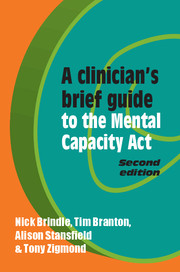Book contents
- Frontmatter
- Contents
- Preface
- Preface to the second edition
- Common abbreviations and terms
- 1 The legal framework: the Mental Capacity Act, the Human Rights Act and common law
- 2 The Mental Capacity Act and the authority to treat
- 3 Assessment of capacity
- 4 Best interests
- 5 Alternative authority – planning for the future
- 6 Independent Mental Capacity Advocates and regulation of research
- 7 Deprivation of Liberty Safeguards
- 8 The Court of Protection, clinically relevant judgments from the courts and writing reports
- 9 The Mental Health Act
- References
- Index
Preface
Published online by Cambridge University Press: 01 January 2018
- Frontmatter
- Contents
- Preface
- Preface to the second edition
- Common abbreviations and terms
- 1 The legal framework: the Mental Capacity Act, the Human Rights Act and common law
- 2 The Mental Capacity Act and the authority to treat
- 3 Assessment of capacity
- 4 Best interests
- 5 Alternative authority – planning for the future
- 6 Independent Mental Capacity Advocates and regulation of research
- 7 Deprivation of Liberty Safeguards
- 8 The Court of Protection, clinically relevant judgments from the courts and writing reports
- 9 The Mental Health Act
- References
- Index
Summary
Although this is a partner volume to A Clinician's Brief Guide to the Mental Health Act, the Mental Health Act and the Mental Capacity Act are very different in both their scope (the Mental Capacity Act being much more widely relevant) and provisions. The authority of the Mental Capacity Act is frequently used without the user realising it. For clinicians, it has largely replaced the common law as the authority for providing medical care and treatment to people (over 16 years of age) who lack the capacity to consent for themselves.
This book is designed as an easy-to-read and interesting guide to understanding those parts of the Mental Capacity Act 2005 (MCA), including the 2007 Deprivation of Liberty amendments, which clinicians need in their daily practice. It covers how to assess whether a person lacks capacity; the range, scope and limitations of the various authorities to treat, including ‘best interests’ decisions, advance decisions and lasting powers of attorney; and the range of safeguards in place, such as the Deprivation of Liberty Safeguards (DoLs), the Court of Protection and Independent Mental Health Advocates. It also includes relevant aspects of the Human Rights Act 1998, the Mental Health Act 1983 and illustrative case law. Although it should be of particular interest to clinicians in England and Wales, it will aid the understanding of everyone who helps care for people who cannot make decisions for themselves or who wishes to make legal provision for their own future care.
More detailed guidance can be found in the Mental Capacity Act and Deprivation of Liberty Safeguards Codes of Practice and many other texts. Acts of Parliament and secondary legislation such as Statutory Instruments can be read and downloaded from the internet. These are readily searchable electronically, so to avoid cluttering the text with numbers we have not cited chapter and verse when using short quotations from Acts.
Acronyms and abbreviations abound in this legislation. We have used very few of these, but readers may find those listed on p. vii useful when reading other sources.
- Type
- Chapter
- Information
- A Clinician's Brief Guide to the Mental Capacity Act , pp. vi - viiPublisher: Royal College of PsychiatristsPrint publication year: 2015

